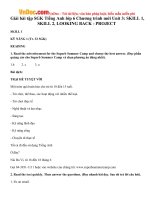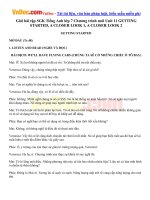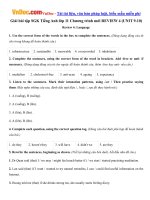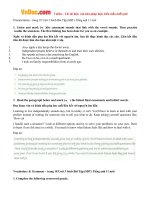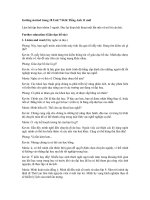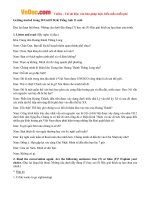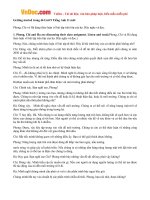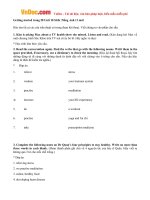giai bai tap sgk tieng anh lop 11 chuong trinh moi unit 3 becoming independent
Bạn đang xem bản rút gọn của tài liệu. Xem và tải ngay bản đầy đủ của tài liệu tại đây (513.72 KB, 18 trang )
Getting started trang 30 Unit 3 SGK Tiếng Anh 11 mới
Tìm những câu có sử dụng động từ nguyên mẫu có TO sau tính từ hoặc danh từ trong
đoạn hội thoại rồi viết vào khoảng trống cho bên dưới.
1. Listen and read
* Bài dịch
Mai: Mình có thể thấy rằng bạn và Hoàng Minh đã trở thành bạn thân của nhau.
Lan: Đúng vậy. Mình thật sự thích cậu ấy vì cậu ấy không dựa vào người khác để được
giúp đỡ và không bị ảnh hưởng bơi ý kiến của người khác.
Mai: Mình cũng thấy vậy. Cậu ấy rất độc lập.
Lan: ừ, cậu ấy còn là một học sinh có trách nhiệm. Cậu ấy luôn hoàn thành nhiệm vụ
đúng thời hạn và chưa bao giờ bị nhắc nhớ về bài tập và những công việc khác.
Mai: Đúng vậy.
Lan: Cậu ấv còn là một người đáng tin cậy. Tuần trước nhóm mình nhận một dự án và
được giao làm phần khó nhất của dự án đó. Cậu ấy đã rất cố gắng và đã làm rất tốt.
Mai: Thật là tốt khi có một người bạn có thể tin cậy được. Cậu ấy dường như rất quyết
tâm.
Lan: Cậu ấy là vậy đó. Tháng trước chúng mình được giao cho một bài toán hóc búa. Hau
hết các bạn lớp mình đều bó tay, vậy mà cậu ấy thức suốt đêm để giải và đã giải được.
Mai: Thật đáng ngạc nhiên!
Lan: ừ, thậm chí thầy dạy Toán lớp mình đã rất ngạc nhiên khi đọc lời giải của cậu ấy.
Một điều tốt về cậu ấy nữa là cậu ấy là người tự lực. Cậu ấy luôn cố gắng tìm cách giải
quyết cho những vấn đề của mình và hiếm khi cần sự giúp đỡ từ người khác.
Mai: Chác hắn bố mẹ cậu ấy thật sự hài lòng khi có một cậu con trai như vậy.
Lan: Dĩ nhiên rồi. Cậu ấy còn giúp đỡ mọi người trong nhà rất nhiều. Vậy mà cậu ấy vẫn
có thời gian đọc sách vì thế mà cậu ấy rất nhanh nhạy tin tức về những gì đang diễn ra
trên thế giới. Nói chuyện với cậu ấy thật thú vị.
Mai: Lúc nào đó mình sẽ nói chuyện với cậu ấy.
Lan: ừ, bạn nên thử xem sao. Cậu ấy còn là người tự tin và quyết đoán. Cậu ấy luôn tin
vào chính bản thân mình và mình thật sự ngường mộ khá năng đưa ra quyết định nhanh
chóng. Cậu ấy là một người rất độc lập!
Mai: Thật tuyệt! Bạn thật may mắn khi có một người bạn thân giống cậu ấy.
2. Answer the questions about the conversation. (Trả lời câu hỏi theo bài hội thoại)
* Đáp án
1. Because Minh doesn't rely on other people for help and isn’t intluenced by other
people's opinions.
2. Because he always completes his tasks on time, and never needs to be reminded about
the assignments and other schoolwork.
3. He tried hard and spent the whole night on a hard Maths problem when most students
in the class had given up.
4. He always tries to find solutions to his problems and seldom needs help from others.
5. Responsible, reliable, self-reliant, determined, well-informed and confident.
6. Student's own answers
3. Read the conversation again. Match the words with their definitions. (Đọc lại đoạn
hội thoại rồi ghép nhừng từ đã cho phù hợp với định nghĩa của chúng)
1. d
5. f
2. e
3. b
4. c
6. a
4. Find the sentences with to-infmitives after adjectives or nouns in the conversation
and write them in the spaces below. (Tìm những câu có sử dụng động từ nguyên mẫu
có TO sau tính từ hoặc danh từ trong đoạn hội thoại rồi viết vào khoảng trống cho bên
dưới.)
1. It's good to have a friend you can rely on.
2. Even our Maths teacher was very surprised to read his answer.
3. His parents must be really pleased to have such a son.
4. But he still has time to read,...
5. It's interesting to talk to him.
6. I really admire his ability to make decisions so quickly.
7. You're lucky to have a close friend like him.
Skills trang 34 Unit 3 SGK Tiếng Anh 11 mới
Hãy tưởng tượng rằng em gặp phải một trong những vấn đề trên. Hãy viết một lá thư
tương tự như trong bài tập 2 cho cô Brown về một khóa học thích hợp và hỏi thêm thông
tin về:
READING
1. Work with a partner, ask and answer the questions. (Làm việc với bạn bên cạnh,
hỏi và trả lời câu hỏi.)
* Câu trả lời tùy thuộc học sinh
2. Read the text and select the statement that expresses its main idea.(Đọc bài đọc và
chọn câu diễn tả ý chính của bài.)
* Đáp án: D Time-management skills has many benefits and there arc three steps to
develop them.
3. Read the text again. Dccidc whether the sentences are true (T), false (F), or not
given (NG). (đọc lại bài đọc rồi quyết định xem nhừng câu sau đây đúng (T). sai (F) hay
không có thông tin (NG))
T
F
1
Elderly people don't strive for being independent.
2
The ability to be independent comes naturally to a
person when he/ she grows up.
✓
3
Teenagers only need time-management skills to be
independent.
✓
4 When teenagers are able to complete their daily tasks
and duties at school and at home, they have more
confidence and self-esteem.
5
Having good time-management skills mean you can use
your time wisely.
✓
✓
✓
4. Answer the following questions. (Trả lời những câu hỏi dưới đây.)
* Đáp án
1. With good time-management skills, vou don't feel very stressed when exam dates are
approaching; you can act more independently and respossibly, get better grades at school
and have more time for family and friends.
2. Write the things you will have to do on a planner or an app on your mobile device, and
put time limits on them.
3. So you can check them later.
4. Decide what is important to you and give it the most of vour time or add it to the top of
your list.
5. Once routines are developed, they take less time to do.
NG
5. Work in groups. Discuss the questions. (Làm việc theo nhóm và thảo luận những câu
hỏi sau.)
Học sinh làm việc theo nhóm và trình bày ý kiến cá nhân
* Bài dịch
Kỹ năng quản lý thời gian
Việc trở thành người độc lập là khả năng tự chăm sóc bản thán và không cần dựa dẫm
vào bất kỳ ai khác. Đó là điều mà nhiều bạn trẻ đang nỗ lực để đạt được. Tuy nhiên khả
năng sống độc lập không phải phát triển tự nhiên: bạn cần có một số kỹ năng sống để
không phụ thuộc vào cha mẹ hoặc anh chị mình. Trong số những kỹ năng đó thì kỹ năng
quan lý thời gian có lẽ là kỹ năng quan trọng nhất. Khi bạn có kỹ năng quản lý thời gian
tốt. bạn sẽ có được sự tự tin và sự tự tôn trọng bản thân. Những kỹ năng nàv cũng sẽ giúp
bạn làm tốt công việc hàng ngày của bạn bao gồm cả trách nhiệm cua bạn ở trường cùng
như ở nhà. Nếu bạn sử dụng thời gian một cách khôn khéo, bạn sẽ không cảm thấy bị áp
lực khi ngày thi đến gần. Bạn còn có thể hành động một cách độc lập và có trách nhiệm
hơn. đạt nhiều điểm cao hơn ở trường và có thêm nhiều thời gian hơn dành cho gia đình
và bạn bè.
Có được kỹ năng quản lý thời gian cũng không phai là quá khó. Đầu tiên bạn hãy lập kế
hoạch cho những việc bạn cần làm trên bảng kế hoạch hoặc trên một ứng dụng ở điện
thoại di động của bạn. Hãy sắp xếp chúng theo thời gian biểu đế sau đó bạn có thể kiểm
tra. Bạn hãy xác định bạn cần bao nhiêu thời gian cho mỗi công việc và giới hạn thời gian
cho công việc dỏ. Thử hai, bạn hãy ưu tiên cho các hoạt động của bạn. Neu bạn có qua
nhiều việc phải làm trong một ngày hay một tuần, bạn có thể sẽ lúng túng vì phải tìm
cách thu xếp công việc. Vì thế mà hãy quyết định việc nào là quan trọng với bạn và dành
nhiều thời gian nhất cho công việc dó hoặc xếp nó lên đầu danh sách. Thứ ba. bạn hây
xây dựng lề thói làm việc hàng ngày vì khi đã thành lề thói hàng ngày thì chúng sẽ tốn ít
thời gian thực hiện hơn.
Kỹ năng quản lý thời gian khônu thể trong một ngày mà có được. Tuy nhiên khi bạn đă
có những kỹ năng đó. chúng có thể giúp bạn trở nên độc lập.
SPEAKING
1. The table below presents the skills teens need to develop in order to he
independent, and the reasons why those skills are necessary. Work in pairs. Discuss
and match the skills with the appropriate reasons. (Bảng dưới đây trình bày những kỹ
năng các bạn thanh thiếu niên cần xây dựng cho mình để trở thành người độc lập và lý do
tại sao những kỹ năng đó là cần thiết. Làm việc theo cặp. thào luận và ghép các kỹ năng
với những lý do phù hợp.)
*
Đáp án
1. d
2.f
5. g
6. b
3.C
4. a
7. C
2. Lan and Minh are talking about what they think arc the most important skills the)
need in order to be independent. Use the words in the box to complete their
conversation. Then practicc it in pairs. (Lan và Minh đang nói về những điều họ cho là
những kỹ năng quan trọng nhất để trở thành người độc lập. Hãy dùng từ cho trong khung
để hoàn thành cuộc nói chuyện của các bạn ấy rồi tập hội thoại theo cặp.)
*Đáp án:
1. loneliness
3. Interpersonal communication
2. decisions
4. communicate
3. If you want to he independent, which of the skills in 1 are the most important for
you? Work in pairs. Use the ideas in 1 to have a similar conversation as the one in
2. (Nếu bạn muốn độc lập, theo bạn kỹ năng nào ở bài tập 1 là quan trọng nhất? Theo cặp.
hãy sử dụng những ý tưởng ở bài tập 1 làm thành một cuộc hội thoại tương tự như ở bài
tập 2.)
*
Câu trả lời tùy thuộc học sinh.
LISTENING
How parents help you become independent.
1. Look at the photo and answer the questions. (Hãy nhìn tranh và trả lời câu hỏi.)
- What are the people in the photo doing?
The father is helping the boy ride a bikeẾ
- Do you think the boy needs his father's assistance to learn to ride a bicycle
independently?
(Câu trả lời tùy thuộc học sinh)
2. Listen to an interview on Life Skills, the most popular radio show for teens and
parents, and match the statements with the speakers. (Hãy nghe cuộc phỏng vấn nói
về Những kỹ năng sống, chương trình phát sóng truyền thanh được yêu thích nhất dành
cho tuổi thiếu niên và các bậc phụ huynh rồi ghép những lời phát biêu theo đúng người
nói.)
* Đáp án:
Long: b, f
Tuan: a,d
Minh: c, e
3. Answer the questions.
1. Because they didn't let him do any household chores and drove him to school until he
finished Grade 9.
2. To voice (speak out) his opinions.
3. They focus on teaching him about responsibility.
4. If he does his responsibility well, they give him a reward.
5. To do chores and follow a set routine.
6. He can make his own choices about these items.
4. Work in groups. Tell your group members whether you were brought up in the
same way as Long, Tuan, or Minh. (Làm việc theo nhóm. Hãy nói cho các thành viên
trong nhóm biết cm có được dạy giống như Long. Tuấn hay Minh không)
* Câu trả lời tùy thuộc học sinh
Lời trong băng
MC: Hello and welcome to Life Skills, the most popular radio show for teens and parents.
Today. I've invited three Grade 11 students to share with us how their parents help them
to become independent. Long, would you like to start?
Long: Hi. well. I'm the only child, so my parents tend to be overprotective of me.
They didn't let me do any household chores and drove me to school until finished Grade 9.
However, since I was a little child. I’ve always been encouraged to voice my opinions.
My parents even aske for my opinion before they make important family decisions.
MC: That’s great. That helps you develop self-confidence. And Tuan? How do your|
parents help you become independent?
Tuan: Well, my parents focus on teaching me about responsibility. I’m given a list on
responsibilities, such as doing household chores, looking after my grandparents... And my
parents make sure that I fulfill all of them. If I fail. I get punished. Bui if I do them well, I
get a reward. This keeps me motivated.
MC: Your parents seem strict, but also very fairễ What about you, Minh?
Minh: My parents set some limits and establish rigid rules about important issues. I have
to do chores and follow a set routine. But I can make my own choices about personal
things such as clothes, books or toys. My parents encourage me to consider all options
before making my own decisions.
MC: Yes, setting limits can teach you self-discipline, and keep you safe and healthy.
It's also great that your parents teach you decision-making skills. I hope thai one day
you'll be ready to leave home and live independently. Thank you so much for joining the
show.
WRITING
1. Read the advertisement for life skills courses in Teenage Magazine below and
answer the questions.(Hãy đọc mục quảng cáo về các khóa học kỹ năng sống trên Tạp
Chí Thiếu Niên dưới đây rồi trả lời câu hỏi)
TRUNG TÂM RÈN LUYỆN KỸ NĂNG NGÔI SAO XANH
Những kỹ năng bạn cần để trở thành người độc lập
Bạn có muốn trở thành người độc lập?
Bạn có muốn sống dựa vào chính minh một cách thành công?
Vậy thì hãy theo khóa học của chúng tôi. chúng tôi sẽ dạy cho bạn những kỹ năng bạn
cần. Chúng tôi có rất nhiều khóa học khác nhau dành cho bạn.
Đối mặt với sự cô đơn
Đặt mục tiêu
Xư lý sự căng thẳng
Quản lý thời gian
Các kỹ năng tương tác cá nhân Và nhiều hơn nữa ...
Hãy ghi danh theo học ngày hôm nay và được xếp vào lớp nhừng người đến sớm
Để biết thêm thông tin. hãy viết thư về:
Ms. Angela Brown, Blue Rose Rd. Chanel. FL 32924
*
Đáp án
1.
2.
3.
4.
5.
Courses that teach the skills people need to become independent.
Those who want to be independent/ live on their own successfully.
The skills to overcome the feeling of loneliness.
A discount on tuition fee.
Write to Ms Angela Brown.
2. Denise is interested in the life skills courses. Below is her letter asking for further
information, but the parts are jumped-up. Put them in the right order according to
the template on page 32. (Denise quan tâm đến khóa học dạy kỳ năng sống. Dưới đây là
bức thư cô ấy viết yêu cầu niết thèm thông tin, nhưng những phần trong bức thư đã bị đảo
lộn. Hãy xếp chúng lại theo đúng thứ tự theo mẫu viết thư ở trang 32.)
*
Đáp án
1. d
e
2. a
6.C
3. f
4. b
5.
3. Match each problem with its sign. Then discuss with a partner. (Hãy ghép từng vấn đề
một với các dấu hiệu của nó. Sau đó thảo luận với bạn bên cạnh.)
* Đáp án
1. Lacking time-management skills: c,d
2. Suffering from stress: a, e
3. Lacking interpersonal: b, f
4. Imagine that you have one of the problems above. Write a letter similar to the one
in 1 to Ms Brown for advice on a suitale course and get further information
about: Hãy tưởng tượng rằng em gặp phải một trong những vấn đề trên. Hãy viết một lá
thư tương tự như trong bài tập 2 cho cô Brown về một khỏa học thích hợp và hỏi thêm
thông tin về: )
course duration (thời lượng khóa học)
lecturer/ trainer (giáng viên/ huấn luyện viên)
starling date (ngày bắt đầu học)
certificate, etc (chứng chỉ ...)
*
Bài viết gợi ý
December 15th, 2015
Dear Ms Brown.
I am writing to ask you about the life skills courses you advertised in the Youth
Magazine.
! am now in Grade 11 and have such a lot of work to do that I don't have time to finish all
Could you advise me how I can use mv time wisely and properly? I would also like to
know which course is suitable for me and how much the tuition fee will be. I would he
grateful if you could give me more information about the course duration, the trainer in
charge, the starting date and the certificate I will receive after finishing the course.
I hope that your answer will help me make the right choice. I'm looking forward to
hearing from you soon.
Yours sincerely,
Tran Bao Ngoc
Language trang 32 Unit 3 SGK Tiếng Anh 11 mới
Làm việc theo cặp. gạch dưới những động từ nguyên mẫu có TO trong những câu em tìm
được ở bài tập 4 trong phần GETTING STARTED. Hãy chú ý đến cách dùng của các
động từ nguyên mẫu có TO.
VOCABULARY
1. Complete the table with words that have the same roots as the adjectives in the
first column. Some adjectives do not have all the corresponding word forms. Use a
dictionary, if necessary. (Hoàn thành bảng dưới đây bằng nhừng từ có cùng gốc với
những tính từ ở cột thứ nhất. Một số tính từ không có dạng thức từ phù hợp. Dùng từ điển
khi cần.)
Adjective
Noun
Adverb
1
reliable
reliability
reliably
2
confident
confidence
confidently
3
independent
independence
independently
4
self-reliant
self-reliance
5
decisive
decisiveness
decisively
6
determined
determination
determinedly
7
responsible
responsibility
responsibly
2. Complete the sentences with some of the words from 1. (Hoàn thành câu bằng một
sổ từ ờ bài tập 1)
*Đáp án
1.reliable
5. self-reliance
2. confidence
6. decisively
3. well-informed
7. Independence
4. responsible
PRONUNCIATION
♦ Linking between a consonant and a vowel
(Nối âm giữa một phụ âm và một nguyên âm)
Khi nói chuyện một cách tự nhiên, chúng ta thường không nói rời rạc từng từ mà
thường nối âm giữa từ với nhau. Thông thường âm cuối của từ trước là một phụ âm sẽ
được đọc nối với từ kế tiếp có âm đầu là một nguyên âm.
1. Listen and repeat the following sentences, paying attention to the linking between
the words. (Nghe và lặp lại những từ sau. chú ý đến sự kết nối giữa các từ với nhau.)
1.
He's a new student in our class.
2.
He always fulfills all tasks on time.
3.
He knows a lot about life and the world around.
4.
Now it’s time for all of us to celebrate our achievements.
5.
An independent person is capablec of doing things by herself.
2. Listen and link (v) the consonant sounds and the vowel sounds. Then practice
reading the sentences. (Nghe và kết nối phụ âm với nguyên âm, sau đó tập đọc những
câu đó.)
1. Line up and wait till tell you what to do.
2. My number is oh nine oh eight seven six oh four oh five (0908760405).
3. You could earn a lot of money if you write an interesting e-book.
4. Once upon a time, there was a frog that lived in a little pond.
5. Take a box from over there and give it to me.
GRAMMAR
- To-infinitives after nouns/ adjectives
(Động từ nguyên mẫu có TO sau danh từ hoặc tính từ)
Chúng ta có thể dùng động từ nguyên mẫu có TO sau một số tính từ để nêu ra lý
do nói rõ cho tính từ đó trong cấu trúc sau:
Noun/ Pronoun + linking verbs + adj + to-infinitive
(be. become...)
*
Những tính từ thường gặp: glad happy, delighted, lucky. amazed, surprised. proud,
determined, pleased, sorry, disappointed, sad, afraid.
Ví dụ: I'm happy to see my form teacher again.
We are delighted to hear about your success.
Chúng ta có thể dùng động từ nguyên mẫu có TO trong cấu trúc với It và một số
tính từ đê đưa ra lời hình luận hay nhận xét.
It + linking verbs + adj (for sb)+ to-infinitive
* Những tính từ thường gặp: easy. difficult, hard, interesting, boring. nice, great, good,
possible. impossible, likely, important, necessary, (un)reasonable.
Vi dụ: It's interesting to talk to him.
It's important for me to have confidence in myself.
Chúng ta CÓ the dùng động từ nguyên mẫu có TO sau một số danh từ trừu tượng
đê nói về những hành động mà chúng có liên quan.
(S + V) + Noun/ Pronoun + to-infinitive
*
Những danh từ thường gặp: advice, ability, ambition, anxiety, attempt, chance.
decision, dream, failure,permission, plan, request. wish, way, demand. determination,
effort, offer, willingness.
Vi dụ: Your dream to become a teacher will come true.
You should find a way to deal with this problem.
♦
Lưu ý cấu trúc
Trong cấu trúc Noun/ Pronoun + linking verbs + adj+ to infinitive thì Noun/
Pronoun là chủ ngữ của câu và của to-infinitive.
Ví dụ: We are proud to be Vietnamese.
* Trong cấu trúc It + linking verbs + adj (for sb)+ to-infinitive thì It là chủ ngữ chính
thức trong khi đó cụm to-infinitive lại là chủ ngữ thật sự của câu.
Ví dụ: It is difficult to get tickets for the concert on Saturday.
To get tickets for the concert on Saturday is difficult.
1. Work in pairs. Underline the to-infinitive in the sentences you found in 4 in
GETTING STARTED. Pay attention to how the infinitives are used. (Làm việc theo
cặp. gạch dưới những động từ nguyên mẫu có TO trong những câu em tìm được ở bài tập
4 trong phần GETTING STARTED. Hãy chú ý đến cách dùng của các động từ nguyên
mẫu có TO.)
* Đáp án
1. It's good to have a friend you can rely on.
(to-infinitive is used in the structure "It + linking verbs + adj + to infinitive")
2. Even our Maths teacher was very surprised to read his answer.
(to-infinitive is used in the structure "Noun/Pronoun + linking verbs + adj + to infinitive'')
3. His parents must be reallv pleased to have such a sonể
(to-infinitive is used in the structure "Noun/ Pronoun + linking, verbs + adj + to
infinitive")
4. But he still has time to read...
(to-infinitive is used in the structure "(S + V) + Noun/Pronoun + to infinitive")
5. It's interesting to talk to him.
(to-infinitive is used in the structure "It + linking verbs + adj + to infinitive")
6. I really admire his ability to make decisions so quickly.
(to-infinitive is used in the structure "(S + V) + Noun/ Pronoun + to infinitive")
7. You're lucky to have a close friend like him.
(to-infmitive is used in the structure "Noun/ Pronoun + linking verbs + adj + to inf ini
five ")
2. Rewrite the sentences using the to-infỉnitive. (Hãy viết lại những câu dưới đây, sử
dụng động từ nguyên mẫu có TO.)
* Đáp án
1. The little boy was afraid to jump into the pool.
2. She is proud to be the leader of the group.
3. The students were excited to hear that they had won the competition.
4. My mother was very surprised to hear that I would take part in the storytelling contest.
5. I'm sorry to disturb you.
3. Combine the sentences using to-infinitive. (Dùng động từ nguyên mẫu có TO để nối
những câu dưới đây)
1. It's unreasonable to expect that everybody will understand you.
2. It's impossible to guess what will happen.
3. It's easy to learn some simple sentences in Knglish such as How are you? or Thank
you.
4. It's necessary to take a map with you when travelling in a foreign country.
5. It's possible for you to finish the project on your own.
4. Rewrite the sentences using the nouns in hrackcts and a to-infinitive
phrase. (Dùng danh từ cho trong ngoặc đơn và một cụm động từ nguvên mẫu có TO đê
viết lại những câu dưới đây.)
*Đáp
án
1. You are not ill so there's no need to stay in bed.
2.
My
teacher
has
the
abilitv
to
make
complicated
things
understand.
3. His decision to take part in the contest surprised all oi'us.
4. I couldn’t get permission lo go to the party.
5. I didn't know about their plan to go to Nha Trane for the summer holidays.
easy
to
Communication and culture trang 38 Unit 3 SGK Tiếng Anh 11 mới
Hãy đọc hai đoạn văn nói về cách dạy con cái của các bậc cha mẹ người Mỹ và người
Việt rồi trả lời câu hỏi
COMMUNICATION
♦ Vocabulary
gotta = have got to gonna = going to
Work in groups. Discuss the extract and prepare a short talk expressing VOUT group’s
opinion about it. You can use the following questions to guide youẺ
(Làm việc theo nhóm, thảo luận về đoạn trích và chuân bị một bài nói ngắn trình bày ý
của nhóm em về đoạn trích đó. Em có thể dùng những câu hỏi gợi ý dưới đây.)
1. What kind of person does the father want his son to grow up to be?
He wants his son to grow up to be independent.
2. What does the father mean by saying: You got a dream you gotta protect it. and want
something, go get/ Do you agree with him? Why/ Why not?
The father wants his son to do everything with strong desire and determination to ges
success.
3. What's your dream? How do you protect it and make sure it will come true one day? (Ý
kiến cá nhân)
CULTURE
1. Read the two passages about how American and Vietnamese parents raise their I
children and answer the questions. (Hãy đọc hai doạn văn nói về cách dạy con cái của
các bậc cha mẹ người Mỹ và người Việt rồi trả lời câu hỏi.)
1. To teach their children to live independently.
2. To protect their children and to provide them with a happy and wealthy childhood.
3. They make them do things such as W'ashing. cleaning and cooking for themselves
fronl the time they are very small.
4. No. Vietnamese parents seldom ask for their children's opinions before making family
choices.
5. They show respect for them and let them voice their opinions on family issues.
6. After they get married.
2. Make some comparisons between the two ways of child raising using While,
whereas, different from. (Hãy so sánh giữa hai cách dạy con, sử dụng While, whereas,
different from.)
* Gợi ý trả lời
While most Vietnamese children sleep with their parents until they go to primary school.
American children get their own rooms from an early age.
Many Vietnamese parents think their most important role is to protect their children and
provide them with a happy and wealthy childhood whereas American parents help their
kids to become self-reliant by making them do such things as washing, cleaning and
cooking for themselves from the time they are very small.
Right after American children finish school, most of them will move out of the family
home and start a truly indenpent life while Vietnamese children do not move out of the
family home before they get married. Even the, may parents still want the couple to live
with them in the same house.
Bài dịch :
Cách dạy con cái ở Mỹ
Đối với nhiều người Mỹ, nhiệm vụ quan trọng nhất của cha hoặc mẹ là dạy cho con mình
biết sổng độc lập. Từ lúc còn thơ, hầu hết trẻ em Mỹ đều có phòng riêng và không bao
giờ ngủ cùng bố mẹ.
Các bậc cha mẹ người Mỹ giúp con mình trở nên tự lập bằng cách bắt chúng phải làm
những việc như giặt giũ, lau chùi, tự nấu ăn ngay từ khi các em còn rất nhỏ. Để giúp phát
triển sự tự tin của con cái mình, các bậc cha mẹ người Mv luôn bày tỏ sự tôn trọng con
cái và để chúng đưa ra ý kiến của mình về những vấn đề gia đình.
Ngay sau khi rời ghế nhà trường, hầu hết các em đều thoát khởi cuộc sống gia đình và bắt
đầu một cuộc sống thật sự độc lập.
Ở Việt Nam
Nhiều bậc cha mẹ người Việt cho rằng vai trò quan trọng nhất của họ là bảo vệ con cái
mình và cho chúng một tuối thơ đầy đủ, hạnh phúc. Các em bé thường ngủ cùng bố mẹ
và nhiều em mãi đến khi học xong tiểu học mới thôi không ngủ cùng bố mẹ nữa.
Trong khi nhiều trẻ em ở những vùng nông thôn phải đi làm để đóng góp vào việc chi
tiêu trong gia đình, hầu hết các em ở thành phố không phải làm bất cứ việc gì ngoài việc
học. Ở cả thành thị và nông thôn, các bậc cha mẹ hiếm khi hỏi ý kiến con cái trước khi
đưa ra những lựa chọn trong gia đình.
Con cái không thoát ly cuộc sống gia đình trước khi các em lập gia đình. Thậm chí sau
khi con cái kết hôn nhiều bậc cha mẹ vẫn còn muốn con cái mình sống cùng nhà với bố
mẹ.
Looking Back trang 40 Unit 3 SGK Tiếng Anh 11 mới
Viết lại câu, sử dụng danh từ cho trong ngoặc đơn và động từ nguyên mẫu có TO mà
không thay đổi nghĩa của câu.
1. Listen and repeat these sentences. Then listen again and link ) the final
consonants and initial vowels. (Nghe và lặp lại những câu này. Sau đó nghe lại và đánh
dấu nối các phụ âm cuối với các nguyên âm đầu.)
1. He's teacher of English in an urban school.
2. My brother is well-informed about local issues.
3. Most Americans use some forms of discipline for their children.
4. The goal of American parentsjs to help their children to become independent.
5. Her parents even ask for her opinions before they makejmportant decisions.
2. Read the paragraph below and link (^) the final consonants and initial vowels.
TheE listen and check your answers. (Hãy nghe đoạn dưới đây và nối các phụ âm cuối
các nguyên âm đầu. Sau đó nghe lại và kiểm tra câu trả lời của em)
Being independent is being able to take carej)f yourself, and not having to rely on
anyone else. That is what many young people strive for. However, the ability to live
independently does not develop naturally: you need a number of lifeskills to stod reiving
on your parents and older siblings.
VOCABULARY
1. Combine the sentences, using to-infinitives. (Hãy nối các câu lại với nhau, sử dụna
động từ nguyên mẫu có TO.)
*
Đáp án
1. Denis was happy to receive a letter from his mother.
2. Ann was so lucky to pass the exam.
3. It's impossible to learn a foreign language in one day.
4. The students are very keen to take part in the "Green Day" activities.
5. it's necessary for you to develop habits that will keep your bodv healthy and clean.
6. We are relieved to hear that I lelen is feeling better now.
7. It's difficult to guess what will happen.
8. It's important to learn how to get from one place to another.
9. It's important to learn how to cope with loneliness.
10. Dave was very surprised to receive a birthday gift from an old friend.
2. Rewrite the sentences, using the nouns in brackets and to-infinitives without
changing rhe meanings of the sentences. (Viết lại câu, sử dụng danh từ cho trong ngoặc
đơn và động từ nguyên mẫu có TO mà không thay đổi nghĩa của câu.)
*
Đáp án
1. Their goal to win the first prize seems unrealistic.
2. Nobody knew about his dream to become a doctor.
3. Her failure to obey the school rules upset her parents very much.
4. Tania's ability to speak three foreign languages is amazing.
5. Tom's attempt lo persuade his parents to allow him to join the club failed.
6. He made an effort to overcome any difficulties by himself.
Project trang 41 Unit 3 SGK Tiếng Anh 11 mới
Hãy hoàn thành các câu hỏi. Chọn số dựa trên độ chính xác của mỗi lời phát biểu đúng
với em. Con số mà em chọn đại diện cho số điểm em đạt được cho mỗi câu
How independent are you?
1. Complete the questions. Tick (he number based on how accurate each statement
is for you. The number you tick represents the point(s) you get for each item. (Hãy
hoàn thành các câu hỏi. Chọn số dựa trên độ chính xác của mỗi lời phát biểu đúng với em.
Con số mà em chọn đại diện cho số điểm em đạt được cho mỗi câu.)
1. very inaccurate
2. inaccurate
4. accurate
5. very accurate
1. You can cook for yourself.
Very inaccurate 1 2 3 4 5 very accurate
2. You don't feel sad, helpless and uncomfortable when alone.
Very inaccurate 1 2 3 4 5 very accurate
3. You always take the initiative and start your own projects.
Very inaccurate 1 2 3 4 5 very accurate
4. You have good daily habits and keep your body healthy and clean.
Very inaccurate 1 2 3 4 5
very accurate
3. neutral
5. You can make decisions about everyday matters quickly.
Very inaccurate 1 2 3 4 5 very accurate
Add up all the points. The more points you get means the more independent you
are. (Hãy cộng tất cả số điểm vào. Bạn càng có nhiều điểm bao nhiêu, bạn càng là người
độc lập bấy nhiêu.)
2. Work in groups of ten. Make questions from the statements in the questionnaire.
Then use the questions to interview students in your group. Find out how
independent they are. Report the results to the class. (Làm việc theo nhóm 10 người.
Hãy đặt câu hỏi từ những ý kiến trong phiếu điều tra. sau đó dùng những câu hỏi đó
phỏng vấn các bạn học sinh trong nhóm. Tìm xem thứ họ độc lập đến mức độ nào. Báo
cáo kết quả phỏng vấn trước lớp.)

